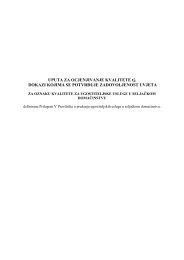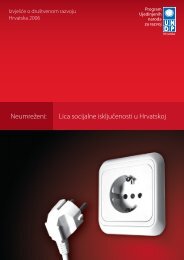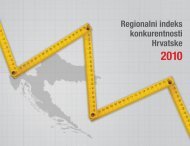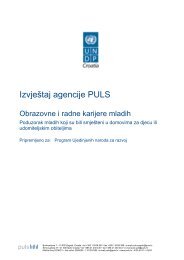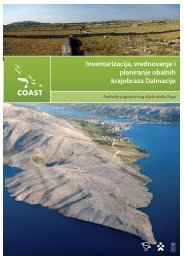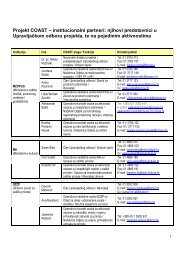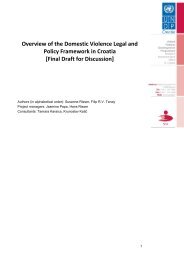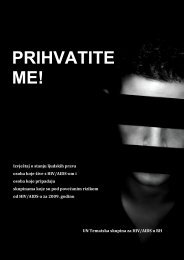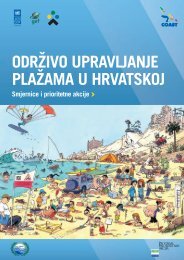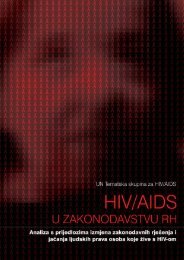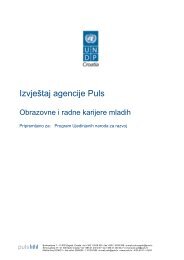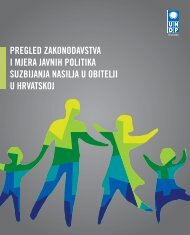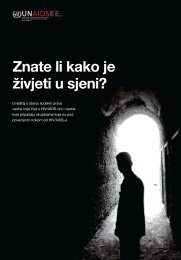WEB engleska verzija end.indd - UNDP Croatia
WEB engleska verzija end.indd - UNDP Croatia
WEB engleska verzija end.indd - UNDP Croatia
- No tags were found...
You also want an ePaper? Increase the reach of your titles
YUMPU automatically turns print PDFs into web optimized ePapers that Google loves.
THE SOCIALLY EXCLUDEDCHAPTER 3a registered organization in Rijeka, and in 2002, afterfive years of its activities, 152 a second organization,Kontra, was registered in Zagreb. Also in 2002, Iskorakwas registered as an NGO dedicated to promoting therights of non-heterosexual individuals; the majority ofits members were and remain young gay men. 153 Thatsame year, the coordination of LGBT (Lesbian, Gay,Bisexual and Transg<strong>end</strong>er) associations was formed in<strong>Croatia</strong>, and the first Gay Pride parade was organized.The emerging NGOs dedicated to representing therights of sexual minorities 154 have had a considerableimpact on the social realities of this social group.Through the activities and anti-discriminatory discourseof civil society, homosexuality has been givena public face. The new visibility of homosexuality hasshed light on a number of issues that were previouslymarginalized as part of a discriminatory cultureagainst people with a different sexual orientation.An environment of contempt, rejection, direct andindirect discrimination, harassment and violenceagainst this social group has been exposed as a socialproblem primarily through the activities of youth-orientedhomosexual associations. 155 Numerous mediaappearances and testimonies given by experts, politicians,and public figures interpreted the increasedvisibility of homosexuality in <strong>Croatia</strong>n society asan epidemic provoked by homosexual lobbying.Following this disturbing tr<strong>end</strong>, the LGBT activistssent a public warning regarding the reproduction ofhomophobia through the authoritative promotion ofnon-scientific attitudes, prejudices, a manipulationof traditional <strong>Croatia</strong>n values, and religious moraldogmas. Demands related to the legal recognition ofsame-sex relationships have clearly shown the extentof inequality, voicing a whole series of rights denied tohomosexual partners as opposed to married couples(Juras and Grđan, 2006).From 2003 to 2005, discrimination based on sexualorientation was recognized in a number of new lawsand am<strong>end</strong>ments. 156 The crowning achievement ofthis legislative reform came in 2003 with the adoptionof the Same-Sex Union Act. Although the Act is a positivestep towards full equality of same-sex couples, itis only a formal recognition of the possibility of samesexpartnerships. It does not include the possibilityof registration and, consequently, the realization ofeconomic, medical and parental rights. The limitationsembedded within the act may be a reflection of the dividebetween increasing liberal policies, and a slightlymore conservative public opinion.Although the attitude of the public to homosexuality isless restrictive and more permissive today than it was30 years ago, 157 <strong>Croatia</strong>n citizens are still divided onthe issue of homosexuality. During a survey conductedin 2003, a staggering 70.3% of people stated that theybelieved sexual relationships between adults of thesame sex are “wrong” while 14.1% of the intervieweesheld an opposite opinion. Fortunately, however, amuch smaller percentage, only 15.4%, agreed with thestatement that homosexuals “are no better than criminals”and that they “should be severely punished” while64.4% did not agree with the statement (Štulhofer andBrajdić Vuković, 2004). In another national survey,50% of citizens stated that they would not accept ahomosexual as a fri<strong>end</strong>, and 47% stated the opposite.Only 39% of those interviewed said that they wouldrecognize the right of a homosexual couple to a maritalunion, with 55% opposing it (Carana, 2002).According to the results of the European Values Surveyof 1999, 158 <strong>Croatia</strong>’s level of homophobia is aboveaverage. Of the <strong>Croatia</strong>ns interviewed, 53% did notwant a homosexual person as a neighbour, whereasan average of only 34% respondents in other European152 Including seting up the first lesbian SOS phone line and an informal counseling service.153 In the first half of the nineties, LIGMA (Lesbians and Gay Men in Action), as the first homosexual association in <strong>Croatia</strong>, was registered.It was active in 1993 and 1994.154 Despite several attempts, no association of transsexuals currently exists in <strong>Croatia</strong>. The rights of transg<strong>end</strong>er individuals are representedby Ženska soba (Women’s Room/), an NGO founded in 2002.155 In the report on social openness in <strong>Croatia</strong>, sexual minorities are indicated (by hundred surveyed experts from various fields) as theminority facing the greatest degree of discrimination (Goldstein, 2005: 60). The same conclusion was made a year later (Bagić and Kesić,2006)156 G<strong>end</strong>er Equality Act; <strong>Croatia</strong>n Radio Television Act; Electronic Media Act; Labour Act; Act on Scientific Activity and Higher Education;am<strong>end</strong>ments to the Criminal Act of 2004 and 2006; and the Civil Servants Act. For details compare Bagić and Kesić, 2006.157 While in 1971 78% of girls and 76% of boys, secondary school students, regarded homosexuality unacceptable, in 2005 the percentageswere 34%and 67%, respectively (Stulhofer et al., 2006).158 The research included 32 European countries (including Turkey), and was conducted on probabilistic national samples.117



